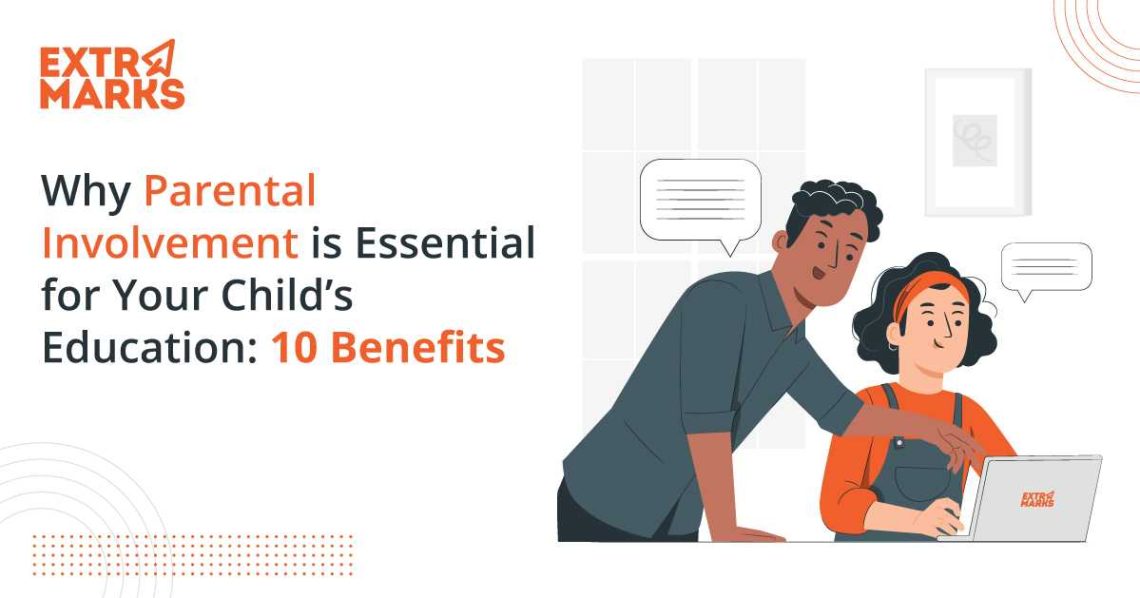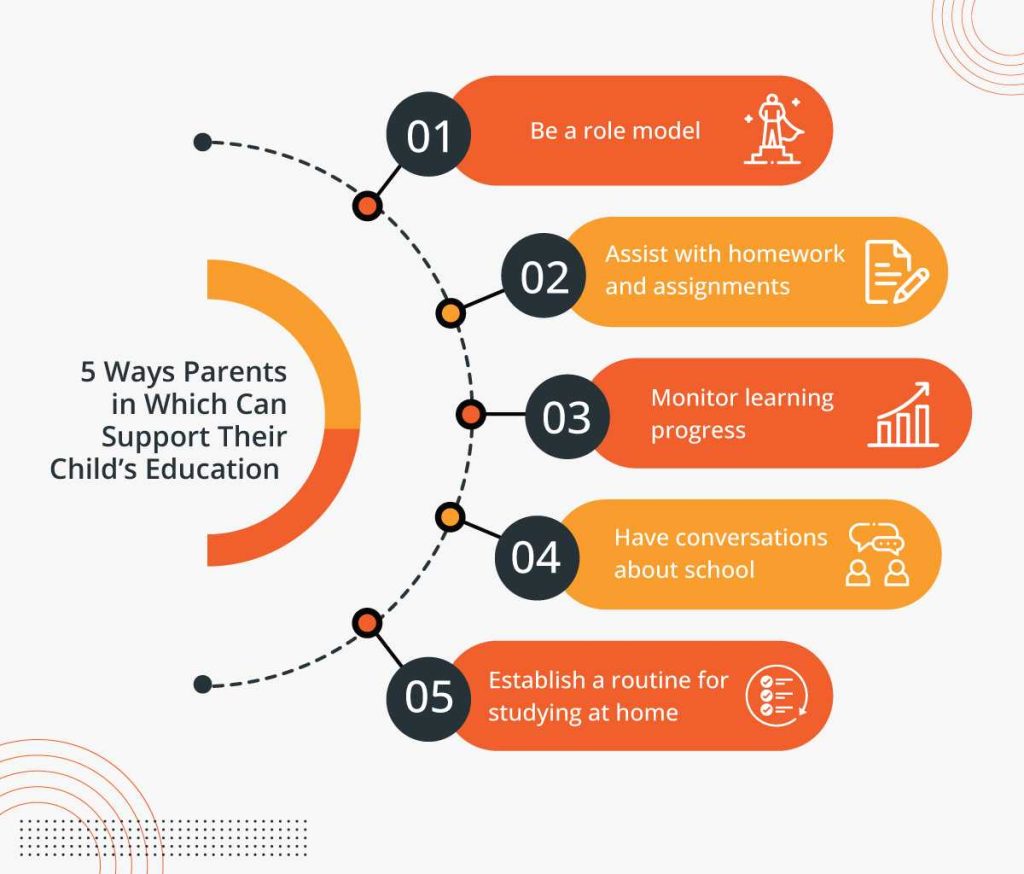Why Parental Involvement is Essential for Your Child’s Education: 10 Benefits

As a parent, if you could wave a magic wand that brings academic success to your child, would you consider it? What if we told you that this magic wand lies within your reach and can entirely transform your child’s educational experience? It’s true! A key success factor for a student’s academic success that transcends nearly every other aspect is parental involvement.
It is widely understood that effective parental involvement can play a pivotal role in a child’s academic journey. Getting the right support from parents encourages children to develop a genuine love for learning, which is essentially the key to long-term success. Parental involvement in education also helps schools nurture a positive relationship with the families that gives them a deeper insight into the child’s learning needs. But what does parent involvement really mean and how can parents be more proactive about their children’s education? Let’s take a look.
Parental Involvement at School – What does it Mean
Every parent wants their child to perform well at school, get better grades and make the most of their academic journey. But sometimes, it can be challenging to understand the role you need to take on and in what capacity you need to get involved in order to best support your child’s learning needs. A simple way to explain what parental involvement in education looks like would be to actively take on shared responsibility with teachers to support and enhance the learning and development of children in a manner that best supports their learning journey. A few ways in which parents can be more involved at school are by being regular members of parent-teacher meetings; volunteering for school activities; being part of parent-teacher seminars or conferences; assisting with the governance of a school council and so on.
The extent of parental involvement is likely to differ based on a number of factors like availability, intent, etc. Sometimes, simply being in touch with teachers and seeking regular updates on students’ performance, progress, behavior in the classroom and areas for improvement is sufficient to guide and support their overall learning experience. Now that we know what parental involvement at school looks like, let’s explore the top 10 benefits that it brings about.
The Benefits of Parental Engagement in School
Some parents believe that the responsibility of their child’s academic performance is entirely the teacher’s responsibility. Although, research conducted by the National Coalition for Parent Involvement in Education suggests otherwise. According to this research, regardless of social status or economic background, a student whose parents are more involved in their schooling and education are more likely to have better grades, higher test scores and improved social and adaptability skills.
It is undeniable that when parents get actively involved in their child’s educational experience, it brings about a huge difference in their social development, academic performance as well as overall well-being. In fact, effective parental engagement in schools can result in substantial benefits for students, teachers, parents and the educational institution itself.
To help you understand the importance of being an active participant in your child’s academic journey, we have compiled the top 10 benefits of parental engagement at school:
#Benefit 1: Improves academic performance
Effective parental involvement in education can directly foster a child’s academic success. If parents are actively involved in school activities and are constantly updated on their child’s performance, behavior, progress, etc. through communication with teachers or online portals, it is likely to encourage them to perform better. When a child is aware of their parents’ constant support and involvement in their academic activities, it helps develop a positive attitude towards learning, resulting in improved performance
#Benefit 2: Enhances social skills and classroom behavior
There have been multiple studies on the impact of parental involvement on a child’s personality and overall behavior. According to one such research conducted by Education Northwest, parental involvement has a significantly positive influence on a child’s social skills and behavior in a classroom. The study generally states, ‘direct parental involvement seems to be the single most powerful approach for fostering improvements in student’s attitudes and behaviors’. When parents are actively involved in meetings, conferences, volunteer support or any such activities at school, it helps them be more in tune with their child’s performance and behavior in the classroom. It gives them the opportunity to guide their child regarding their behavior and help them adapt better.
#Benefit 3: Higher attendance rates
The reason why there is such a great emphasis on the importance of parental involvement in education is because at its core, it is about imparting the value of education to children. So when parents are directly involved at school, it helps them recognize the importance of education, progress and academic achievements. It creates a sense of purpose in them, which keeps them motivated to attend classes, keep track of their curriculum and work hard towards achieving their academic goals
#Benefit 4: Better homework habits
Parents who are involved in their child’s academic journey are more equipped to understand their child’s learning style, identify their study patterns and be aware of their assignments, homework and submission deadlines. When a parent closely monitors a child’s progress and is updated on their day-to-day learning activities, it helps children build better homework habits and complete their school work on time.
#Benefit 5: Fosters parent-teacher communication
When parents and educators work together to bridge the gap between the child’s learning environment at home and at school, it provides children with the right support to pave the path to academic success. Since teachers are primarily responsible for a child’s learning experience at school, staying in touch with them by seeking updates on your child’s performance, behavior, and progress is a great way to remain updated and offer better support to fulfill your child’s learning needs
#Benefit 6: Improves quality of education
The benefits of parent involvement in education goes beyond just helping students become better performers. Getting involved at an institutional level gives parents the leverage to share their opinions and viewpoints regarding the school. This could be anything from constructive criticism to genuine feedback that can be taken into account in order to improve the overall quality of education that the institution offers. Parents may not necessarily be well-versed with every aspect of teaching, however, they can provide suggestions or ideas that address children’s needs better
#Benefit 7: Enhances teachers’ morale
Parental involvement in school enhances students behavior and performance, which is known to positively influence educators’ morale. When parents take on some responsibility for their child’s academic needs, it makes teachers feel more supported and appreciated. Improved communication with parents gives teachers a better insight into the student’s attitude, skills, learning needs and overall performance. This insight not only helps them prepare better but also helps them focus on each child’s interests, aptitude and abilities
#Benefit 8: Greater Retention Rates
We have already looked at how parental engagement at school actually helps children understand the importance of education and results in reduced absenteeism. Similarly, schools that witness a higher rate of parental involvement are more likely to have a greater rate of retention among students. When parents are involved in school activities that function around improving the learning experience, it encourages students to take their academic career more seriously and learn effectively
#Benefit 9: Boosts motivation levels
Students whose parents are involved in their academic journey tend to be more self-disciplined, have higher aspirations and develop greater motivation levels at school. Regular parent-teacher interaction results in children having a well-supported learning environment that is tailored to their academic needs, both at home as well as in school. This contributes to improved focus, high levels of motivation and an overall positive learning experience in the classroom
#Benefit 10: Encourages student involvement
Parental involvement in education can lead students to develop strong social relationships and foster better interpersonal skills. When parents are aware of their child’s personality traits and behavior in a classroom environment, it allows them to be a guiding force and equip their child with the tools that are required to refine their interpersonal skills, build stronger relationships with their peers and promote personal growth. Such encouragement from parents can enable students to be more proactive and be more involved in the classroom
The ultimate goal of having parents be a part of their child’s learning experience is to enable better academic performance and foster holistic development, which in turn benefits the parent, the teacher and the institution.
How Can Parents Get Involved in Their Child’s Education

It is clear that parental involvement in education helps students learn better, develop stronger social skills and enhance their overall academic performance. But figuring out how to get involved can be particularly tricky, especially for those parents who have a full-time job. Here are some simple yet effective ways to help you get started:
1. Establish schedules to create a conducive learning environment
2. Assist your kids during study time
3. Explore supplemental activities to enhance learning
4. Monitor homework and assignments regularly
5. Take up volunteering opportunities at school
6. Prioritize parent-teacher meetings
7. Indulge in conversations with your kids about school
8. Make everyday activities educational
One of the most integral aspects of parental involvement in education is to create a safe space for your child to communicate, learn and thrive in. A productive learning environment at home is the first step towards supporting your child’s academic development. Getting involved in school activities, prioritizing communication with teachers and maintaining a positive attitude about education will help children stay motivated and be confident in their abilities. At Extramarks, we recognize the importance of parental involvement in education, which is why we have put together some tips for parents regarding online safety and children’s privacy to help them actively support and be involved in their child’s academic journey to the best of their abilities!
Last Updated on August 1, 2024









